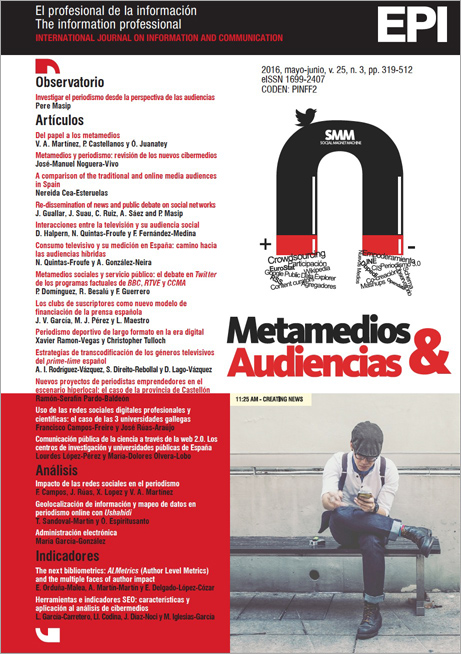Transcoding strategies for prime time TV genres in Spain
DOI:
https://doi.org/10.3145/epi.2016.may.11Keywords:
Social television, TV genres, Programming and audiences, Online media, Social media, TV strategies, Active audiences, Social audience, Atresmedia, Mediaset, RTVEAbstract
Today´s TV context is defined by new services like view-on-demand, "extra" content, and conversations with the audience. The public has more power to decide what to view and can influence the programming with their comments. Because of this, TV channels have created strategies to improve the online products and encourage public participation. Success also depends on social TV and VoD. The objective of this study was to analyze how Spanish prime time has adapted to new media and how programs are managing interactions with the audience. In order to do the analysis, the three main TV groups -RTVE, Atresmedia, Mediaset- were chosen and all the programs were categorized into three genres. The results revealed a weakness in the interactivity strategy of television programs, especially in the informative genres.
Downloads
Downloads
Published
How to Cite
Issue
Section
License
Dissemination conditions of the articles once they are published
Authors can freely disseminate their articles on websites, social networks and repositories
However, the following conditions must be respected:
- Only the editorial version should be made public. Please do not publish preprints, postprints or proofs.
- Along with this copy, a specific mention of the publication in which the text has appeared must be included, also adding a clickable link to the URL: http://www.profesionaldelainformacion.com
- Only the final editorial version should be made public. Please do not publish preprints, postprints or proofs.
- Along with that copy, a specific mention of the publication in which the text has appeared must be included, also adding a clickable link to the URL: http://revista.profesionaldelainformacion.com
Profesional de la información journal offers the articles in open access with a Creative Commons BY license.




